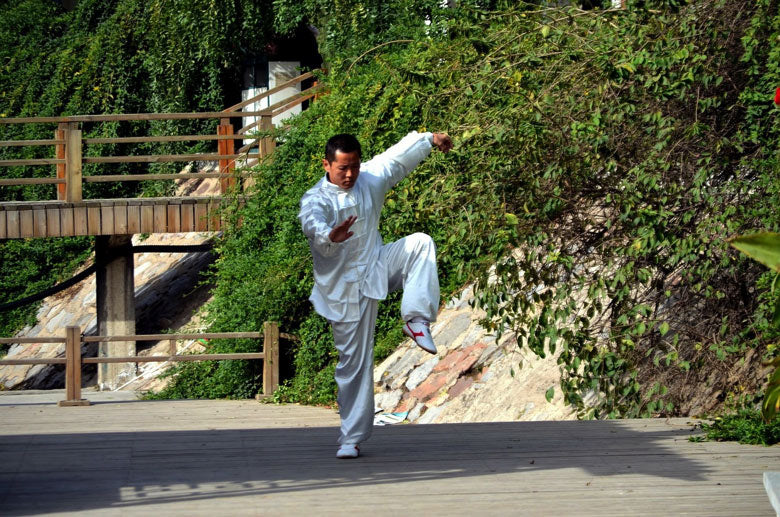Often referred to as “Meditation in Motion”, Tai Chi is a mind-body practice that is a gentle way to reduce stress, increase flexibility, balance and muscle strength. This low impact activity has long been recommended by physicians, nutritionist and physical fitness counselors of all backgrounds because of the versatility of its practice, as well as the many health benefits it provides. Together we will find out the fundamentals of Tai Chi, what to expect from your first session and the many benefits, both mind and body.

What is Tai Chi?
The Mayo Clinic defines Tai Chi (also known as “tai chi chuan”) as “an ancient Chinese tradition that, today, is practiced as a graceful form of exercise…involving a series of movements performed in a slow, focused manner and accompanied by deep breathing.”
The belief system behind Tai Chi is based on ancient Chinese philosophy that the body and mind function as one, with the main life force known as “Qi” that flows throughout the body. It is when we have a blockage of “Qi” that disease and pain occur. Practicing Tai Chi is a way of clearing up any blockages of “Qi” in the body through deliberate motion and meditation, finding balance between the opposing universal elements, Yin and Yang. “Qigong” is the correlating breath and energy work that is often accompanied by with the practice of Tai Chi.

Who can do Tai Chi?
Tai Chi is a very low impact, deliberate form of exercise. The general guidelines for who can practice Tai Chi is just about everyone, in all stages of life. Because it is low impact and low motion, Tai Chi is a favorite among seniors. However, the emotional and health benefits of Tai Chi is what makes this graceful form of exercise appealing to even the most fit athletes alike.
The only restrictions, much like any other form of exercise is to consult a physician if you are recovering from illness or physical injuries, including surgery and if you are pregnant or think you may be pregnant. Also, if you are taking medications that affect your balance or cause you to be lightheaded, it is important to speak with your doctor first before doing any type of exercise.

What can I expect from practicing Tai Chi
To prepare for your Tai Chi session wear comfortable, loose fitting clothes. Loose clothing will accommodate movement without restriction. Wearing sneakers or shoes without heels is best since we will be on our feet and working on balance. Bottled water to stay hydrated is recommended along with an open mind and willingness to learn.
Most sessions begin with a warm up session. This often includes stretching, flexing and any other light, repetitive movements to loosen up your joints and muscles, as well as aid in blood circulation.
Once warmed up and your instructor will teach you forms, or “sets of movements” by demonstration and verbal guidance. The movements in these sets are very slow and deliberate and there is no rush to get through the series. It appears graceful and resemble martial arts in slow motion. This is just one style of Tai Chi but there are many forms such long and short sets and various styles.

What are the Benefits?
Some benefits of Tai Chi, similar to Meditation and Reiki, can be achieved with just one session. Immediate benefits include a reduced anxiety, a deep sense of well being, stress relief and inner calm.
The physical benefits are increased balance, flexibility, muscle strength and improved oxygen intake. Long term practice of Tai Chi provides even greater results. Many studies have been performed to see how Tai Chi measures up to traditional physical fitness exercises and the results are astonishing.
Brisk Walking/Resistance Training Versus Tai Chi:
“113 older adults were assigned to different 12-week exercise programs, including tai chi, brisk walking, and resistance training. People who did tai chi improved more than 30% in lower-body strength and 25% in arm strength — almost as much as those who participated in resistance training, and more than those assigned to brisk walking.”
(SOURCE http://www.health.harvard.edu/staying-healthy/the-health-benefits-of-tai-chi)
That’s not all. If you were impressed with how Tai Chi measured up in physical fitness, wait until you reap the medical benefits, such as improved heart function, sleep quality, arthritis pain, aids in recovery from breast cancer/stroke/heart disease and maintaining bone density in postmenopausal women and more.
All of these data results are from educational research centers such as Tufts University, Yale and the Osher Research Center among many others. The studies are in; Tai Chi is a winner when it comes to tangible benefits.
Conclusion
When we think about physical fitness and wellness, we often conclude to dreadful treadmills and crowded gyms. Tai Chi, often practiced outdoors, can be a great way to incorporate Zen into your fitness routine. It’s also an exercise can be shared with anyone. The idea that this proven and well studied form of mind-body conditioning can be done just about anywhere, anytime and with anyone, makes it one of the most versatile forms of exercise available.
Find a Tai Chi group in your community and try it for yourself- almost every community has a Tai Chi meet up or facilitators. It’s a great way to reconnect with your family in a healthy, loving way, whether it be your niece or your grandmother. If you are in the Miami area, join us on Saturday mornings for Cloud Tai Chi and reap the benefits for yourself in a loving, group setting with us.

